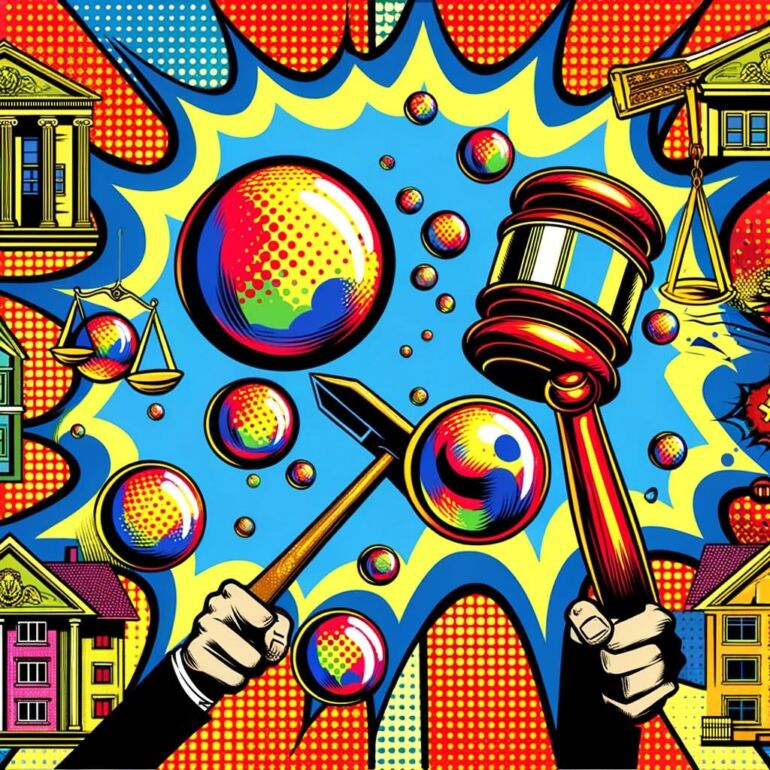In recent decades, the term ‘housing bubble’ has entrenched itself in our collective lexicon, conjuring images of skyrocketing property values, frenzied buyers, and the unsettling aftermath when the bubble finally bursts. But what exactly constitutes a housing bubble, and how can we recognize one?
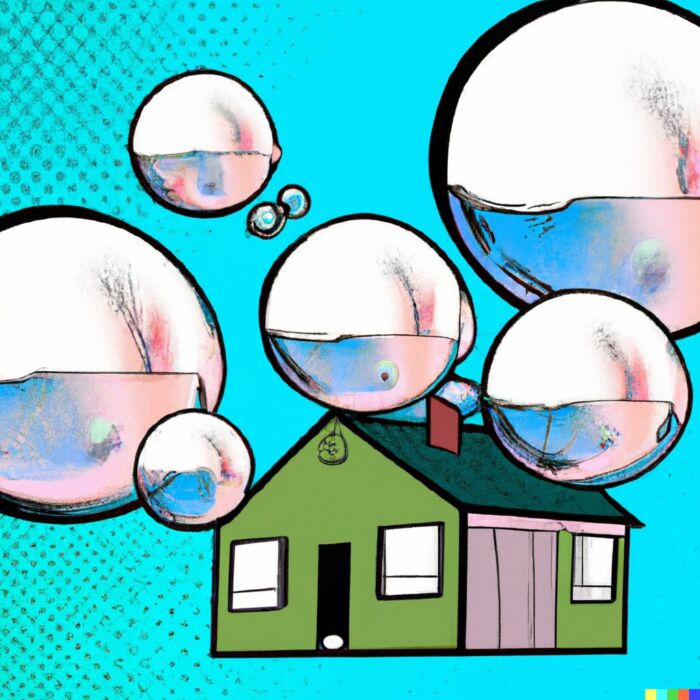
Housing Bubble Definition
A housing bubble occurs when there’s a significant, often rapid, increase in housing prices fueled not by underlying economic fundamentals such as wage growth or genuine demand, but rather by speculation, exuberance, and unsustainable market behaviors. It’s like inflating a balloon – the more air you pump in, the larger it grows, but the material (the balloon’s skin) becomes increasingly stressed and stretched thin. Eventually, the balloon can’t hold any more air and pops. Similarly, a housing bubble ‘pops‘ when prices reach unsustainable levels and start to fall, often as precipitously as they rose.
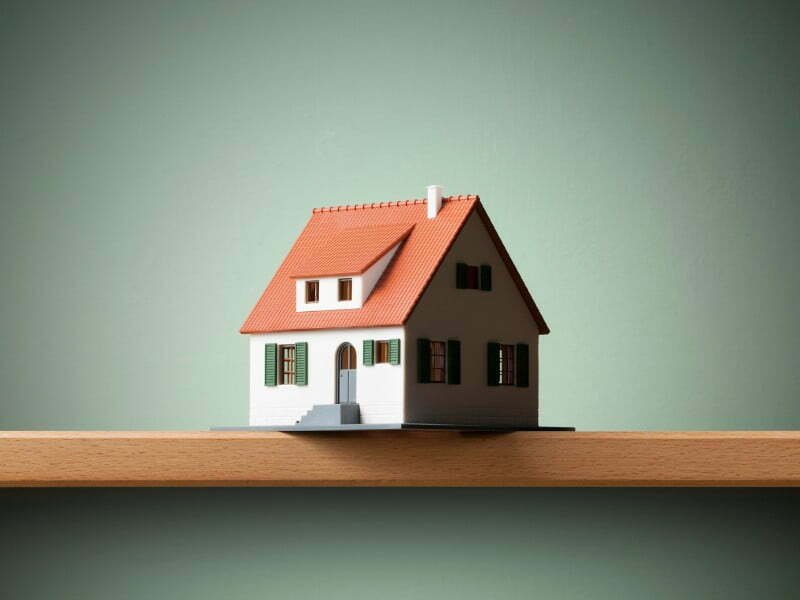
Past Housing Bubbles in History
Delving into the annals of economic history, housing bubbles are hardly a new phenomenon. However, their consequences, given the global interconnectedness of today’s financial systems, can be far-reaching and profound. One of the most notable examples is the 2007-2008 U.S. housing crisis. Leading up to the crisis, a combination of readily available mortgages, speculative buying, and blind optimism fueled a massive rise in home prices. Many believed that housing prices would continue their relentless upward trajectory. However, when the bubble burst, it triggered a cascade of foreclosures, bank collapses, and a global financial meltdown, the ripples of which were felt across continents.
Yet, the U.S. wasn’t alone in experiencing such a phenomenon. Spain in the early 2010s, Japan in the early 1990s, and even the Netherlands in the 17th century with their famous ‘Tulip Mania’ provide cautionary tales of how unchecked speculation and market euphoria can lead to devastating economic crashes.
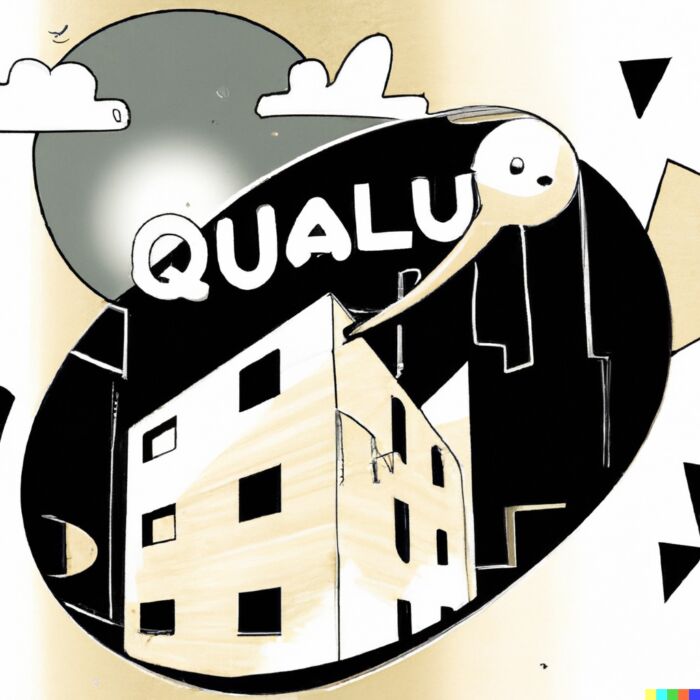
While each bubble has its unique triggers and outcomes, common threads weave through them all: unsustainable price growth, unfettered optimism, a disregard for underlying economic fundamentals, and the painful aftermath when reality reasserts itself.
Understanding what a housing bubble is, and more importantly, recognizing the signs that you might be living in the midst of one, is crucial. It arms individuals with the knowledge needed to make informed decisions, whether you’re looking to buy your first home, invest in properties, or simply understand the economic landscape better.
In the pages that follow, we will delve deeper into these telltale signs, helping you navigate the intricate and often unpredictable world of housing markets.
source: Kalkine Media on YouTube

The Causes of Housing Bubbles
The ebbs and flows of housing markets are influenced by a myriad of interconnected factors. When these factors converge in just the right (or perhaps, wrong) way, they can set the stage for a housing bubble. Below, we explore the root causes and underlying drivers of these precarious market situations.
Easy Access to Mortgages and Excessive Borrowing
One of the most common precursors to a housing bubble is the widespread availability of mortgages, especially to individuals who might not be best positioned to handle such debt. When financial institutions lower their lending standards, it paves the way for more people to access home loans, often without a substantial down payment or a rigorous check of their financial health.
Furthermore, the introduction of exotic or adjustable-rate mortgages can entice borrowers with the promise of low initial interest rates. These might seem manageable at first, but borrowers may not fully grasp the ramifications of rates adjusting upwards in the future. The resultant effect is a surge in demand, driving up home prices and encouraging further borrowing, thus creating a self-feeding cycle.

Overconfidence in the Housing Market
The belief that housing prices will perpetually rise can be intoxicating. As prices continue to climb, a collective mindset emerges where the idea of a downturn seems implausible. Homebuyers and investors alike start operating under the assumption that housing is a ‘sure bet’. This overconfidence fuels demand even further.
It’s essential to remember that markets, no matter how bullish they seem, don’t always go up. History has shown that unchecked optimism often precedes a downfall.
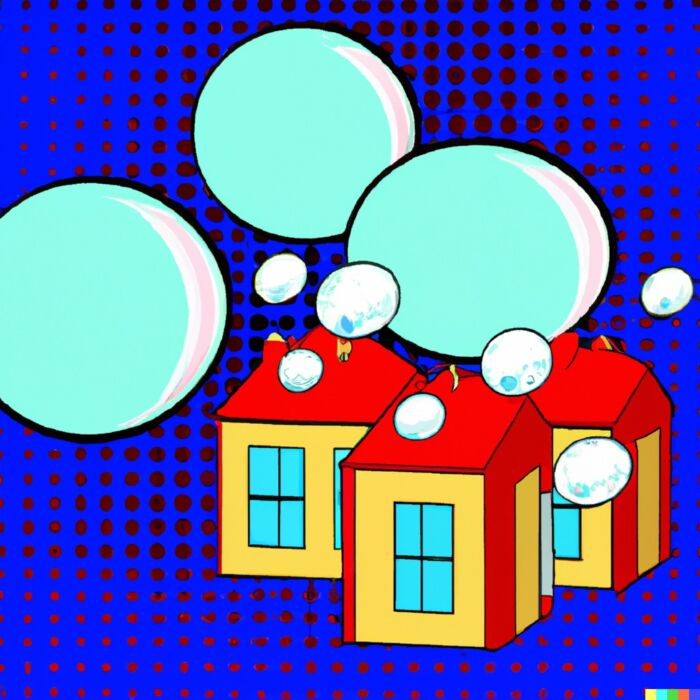
Speculation and Buying Properties with the Intention to Resell Quickly for a Profit
Speculation becomes rampant in a bubbling market. When individuals and investors purchase properties not for the sake of living in them or renting them out long-term, but rather with the primary goal of reselling quickly at a profit, it adds an unstable element to the housing ecosystem.
This ‘flipping’ mentality exacerbates price volatility. As more and more speculators enter the market, they drive up demand and, consequently, prices. But speculative buying is inherently fickle. When signs of a market slowdown emerge, these speculators are often the first to sell, leading to a sudden influx of available properties and a swift downturn in prices.
Overbuilding or Excessive New Construction
Developers often respond to rising property values and increased demand by ramping up construction. In the initial stages, this might seem justified. However, as more and more new units flood the market, supply can quickly outpace genuine demand.
It’s a dangerous lag effect. By the time developers realize that the market is saturated, many projects are already underway, leading to a glut of empty or unsold properties. This oversupply can then exert downward pressure on prices, potentially popping the bubble.

Government Policies Promoting Homeownership
While homeownership is often seen as a marker of personal success and economic stability, government policies that excessively promote it can inadvertently contribute to housing bubbles. For instance, tax incentives for first-time buyers, subsidies, or the deregulation of the financial sector can supercharge demand.
Such policies might be introduced with the best intentions – to increase homeownership rates, stimulate the economy, or respond to public demand. However, when they artificially inflate demand without corresponding increases in supply, or when they encourage individuals to purchase homes they can’t truly afford, they lay the groundwork for a potential market crash.
Housing bubbles are multifaceted phenomena, influenced by economic, behavioral, and political factors. While each bubble has its unique blend of causes, understanding these fundamental drivers helps in identifying warning signs early on. Armed with this knowledge, both policymakers and the public can take steps to mitigate risks and navigate the complex landscape of real estate with greater confidence and caution.
source: George Gammon on YouTube
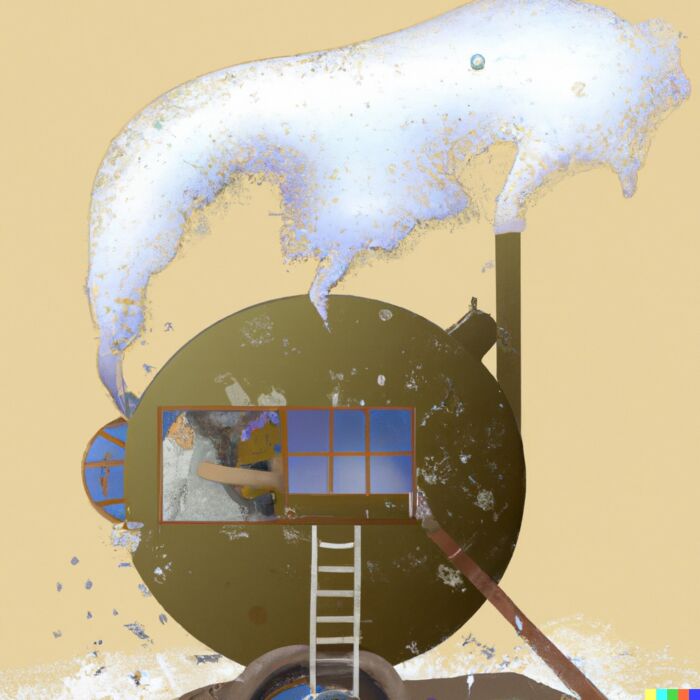
Warning Signs of a Housing Bubble
While the causes of housing bubbles can be complex and multifaceted, they often manifest in recognizable warning signs. Recognizing these signs can be crucial for potential homeowners, investors, and policymakers. Let’s delve into these telltale indicators in detail:
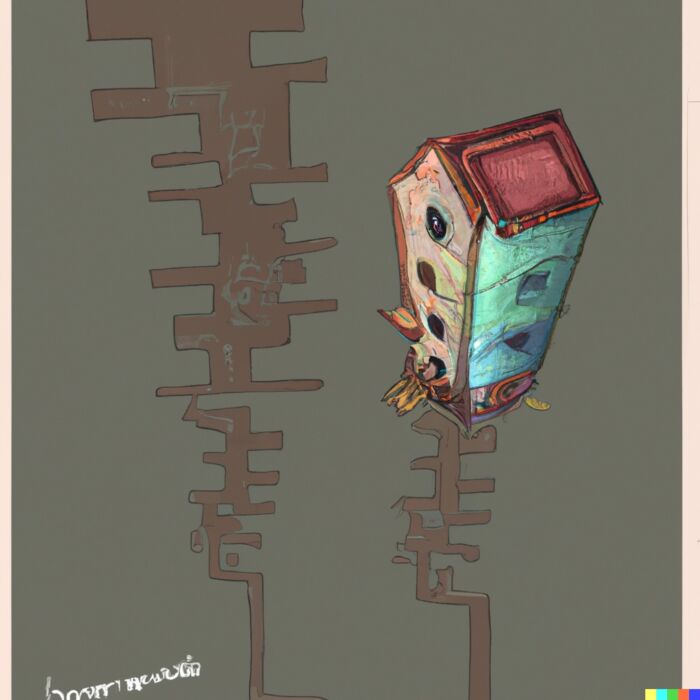
Skyrocketing Home Prices
- Historical context: It’s vital to juxtapose current price trends against long-term averages. Rapid escalations in property values that deviate significantly from historical norms might indicate speculative heat rather than genuine growth rooted in economic fundamentals.
- Disparity between home prices and local incomes: When home prices rise much faster than local incomes, it’s a clear red flag. If most people can’t afford the homes in their area based on their salaries, it suggests that external factors, like speculative buying or easy credit, are inflating prices.

High Ratio of Home Prices to Rent Prices
- The importance of the price-to-rent ratio: This ratio offers a comparative measure between the costs of owning versus renting. A standard benchmark, it provides insights into the relative affordability and appeal of buying a home in a particular market.
- High ratios suggesting unaffordability: When this ratio skews high, it hints that purchasing a home has become significantly more expensive than renting. Elevated ratios might deter genuine buyers, leaving speculators to dominate the market, thereby amplifying volatility.
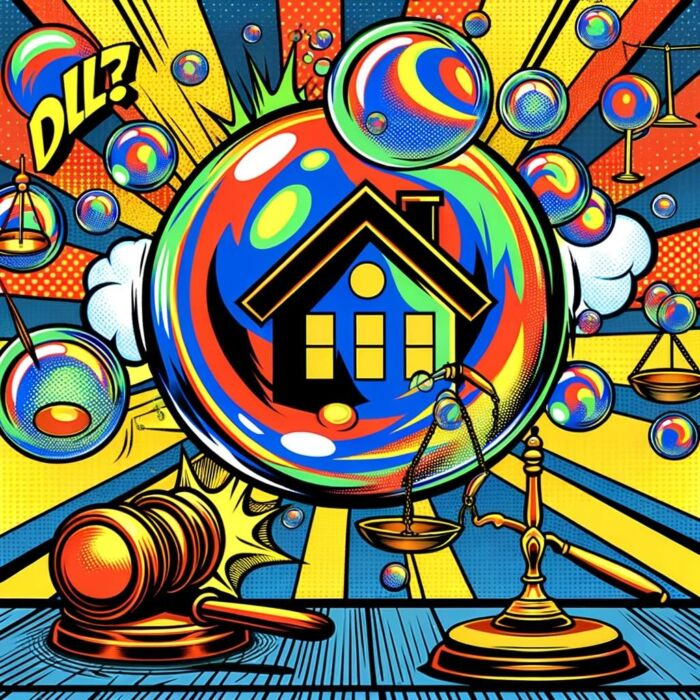
Rising Mortgage Debt
- Mortgage debt relative to GDP: An increasing ratio of mortgage debt to a country’s GDP suggests that a larger portion of economic activity is tied to property buying. This makes the economy more vulnerable to real estate market fluctuations.
- Excessive borrowing: If households are borrowing disproportionately compared to their incomes, it can signal over-reliance on credit, potentially leading to higher default rates in case of economic downturns or interest rate hikes.
Lowering of Mortgage Standards
- Easier loan approvals: A surge in the approval of loans, even to borrowers with questionable credit histories, is a worrying sign. This could lead to a future wave of defaults if these homeowners face any financial hardships.
- Risky mortgage products: The proliferation of exotic mortgage products, designed to lure in buyers with initially low rates or minimal down payments, can amplify market risks. When these adjustable rates reset or other conditions change, it can lead to payment shocks for homeowners.
Unrealistic Future Expectations
- Endless optimism: A widespread belief in never-ending property value appreciation can be a bubble’s hallmark. Such unchecked optimism often overrides caution, driving prices to unsustainable heights.
- Disregarding the past: Assuming “this time is different” and ignoring historical market downturns is dangerous. No market is immune to corrections, regardless of prevailing sentiment.

Speculative Buying and House Flipping
- Short-term investments surge: A sharp uptick in property purchases primarily for short-term resale indicates a speculative frenzy, not genuine, long-term interest in the housing market.
- Shift in housing perception: When homes are increasingly seen as quick profit vehicles instead of long-term investments or places of residence, it can destabilize the market, making it susceptible to sudden downturns.
Increased Supply or Overbuilding
- Rising vacancy rates: A surge in unsold or unrented properties indicates a supply-demand mismatch, potentially signaling an oversaturated market.
- Overzealous construction: If new building projects significantly outpace demand, it can lead to a glut of properties on the market, exerting downward pressure on prices.
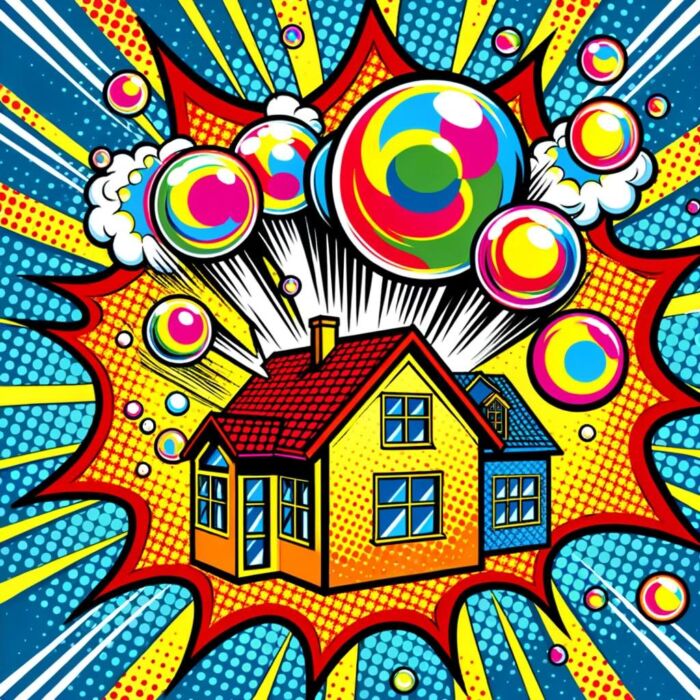
Rising Interest Rates
- Mortgage affordability: As interest rates rise, monthly mortgage payments can jump, straining homeowners who were already stretching their budgets.
- Central bank policies: Interest rate hikes are often tools used by central banks to cool overheating economies or curb inflation. However, they can also unintentionally prick housing bubbles if markets are overly reliant on cheap credit.
Housing bubbles, while complex, often give off clear warning signs. By staying informed and understanding these indicators, one can navigate the housing market with a greater sense of awareness and caution, potentially sidestepping the pitfalls that come with a market correction or crash.

Effects of a Bursting Housing Bubble
The rupture of a housing bubble can send shockwaves not just through the real estate sector, but also throughout the broader economy. The aftermath of such an event touches households, financial institutions, and even government policies. Let’s explore these consequences in detail:
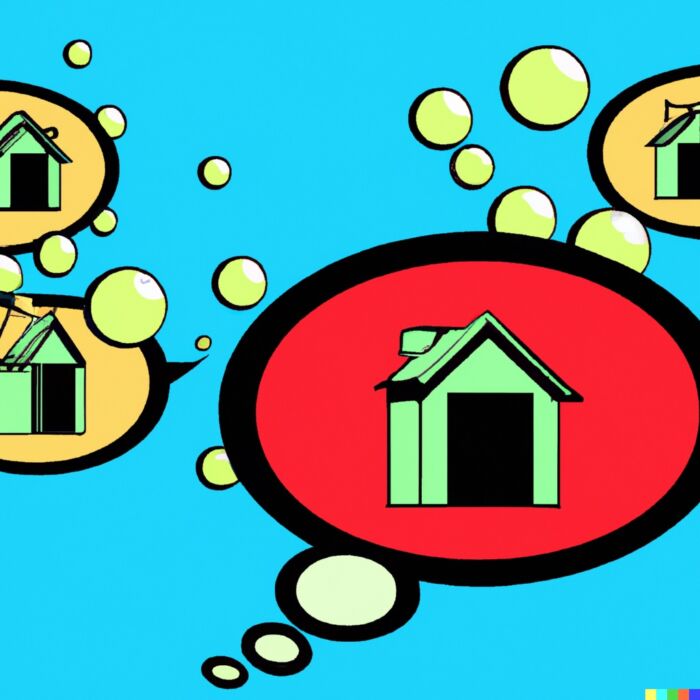
Home Value Decline
- Immediate depreciation of homes: When a housing bubble bursts, one of the most direct and noticeable consequences is the sharp decline in property values. Homes that might have seen double-digit percentage increases in their values in the preceding months or years can suddenly and precipitously drop in worth. This sudden decline can be jarring for homeowners, particularly those who purchased at the peak of the bubble, anticipating continued growth.
- Underwater mortgages: As home values plummet, a significant number of homeowners can find themselves in the precarious position of owing more on their mortgage than their home is currently worth. This phenomenon, known as being “underwater” on a mortgage, can lead to feelings of being trapped, as selling the property wouldn’t cover the outstanding loan amount. Beyond the financial strain, this can also take a significant emotional and psychological toll on homeowners.
Increase in Foreclosures
- Homeowners unable to meet mortgage payments: As home values decline and some homeowners find themselves underwater, combined with potential economic downturns and job losses, many might struggle to keep up with their mortgage payments. This is particularly acute for those with adjustable-rate mortgages that reset to higher interest rates.
- Lenders seizing properties: As more and more homeowners default on their loans, financial institutions step in to recoup their losses, leading to an increase in foreclosures. These seized properties are often sold at significantly reduced prices, further depressing the overall housing market. Moreover, neighborhoods with high foreclosure rates can see a cascading effect, where the value of neighboring properties also decreases.
Economic Ripple Effect
- Impact on banking and financial sectors: Banks and financial institutions that had heavily invested in real estate or mortgage-backed securities can face substantial losses when a housing bubble bursts. This can lead to a tightening of credit standards, making it harder for consumers and businesses to secure loans. In extreme cases, as witnessed during the 2007-2008 financial crisis, some financial institutions might face insolvency, necessitating government interventions or bailouts.
- Decreased consumer spending due to lost equity: Homeowners often view their homes as a form of savings or wealth. When property values plummet, the perceived wealth and equity vanish, leading to a decline in consumer confidence. This can translate to reduced spending in other sectors of the economy, from automobiles to appliances, as homeowners tighten their belts in the face of financial uncertainty.
- Potential onset of a recession: The combined effects of banking sector woes, reduced consumer spending, and the broader loss of confidence can contribute to a full-blown economic recession. As businesses face reduced consumer demand, they may cut back on hiring or even lay off workers, further exacerbating the economic downturn. The ripple effect from a burst housing bubble can impact sectors far removed from real estate, illustrating the interconnectedness of modern economies.
The bursting of a housing bubble isn’t just a crisis confined to the real estate sector. Its repercussions are felt widely, touching various facets of the economy and society at large. For homeowners, lenders, and policymakers, understanding these potential outcomes underscores the importance of recognizing and, where possible, mitigating the precursors of housing bubbles.
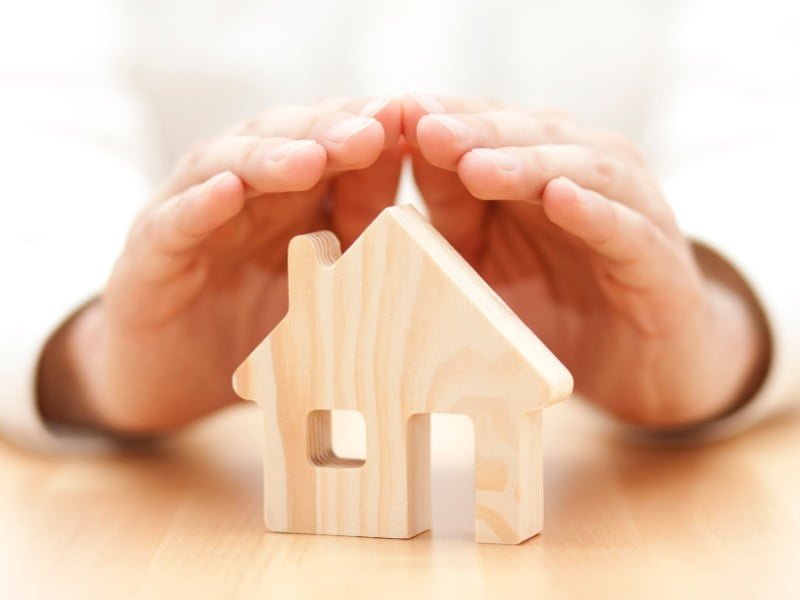
How to Protect Yourself
The turbulent and unpredictable nature of housing bubbles demands that individuals take precautions to safeguard their financial well-being. Whether you’re a potential homeowner, a current homeowner, or an investor, understanding the mechanisms of protection can be a lifesaver during turbulent times. Here’s a closer look at some strategies to insulate oneself from the ill effects of a housing market collapse:
Staying Informed
- Regularly assessing the health of the local housing market: The first step to making informed decisions is having accurate and up-to-date information. Keeping an eye on local real estate trends, such as average home prices, time on the market, and inventory levels, can offer insights into the market’s health. Engaging with local real estate professionals or attending community meetings can also provide ground-level intelligence.
- Being aware of macroeconomic indicators and policies: While local trends are crucial, understanding the broader economic picture is equally essential. Macroeconomic indicators like unemployment rates, GDP growth, and interest rate policies can influence the housing market. Being attuned to changes in these areas can help you anticipate potential shifts in the real estate sector.
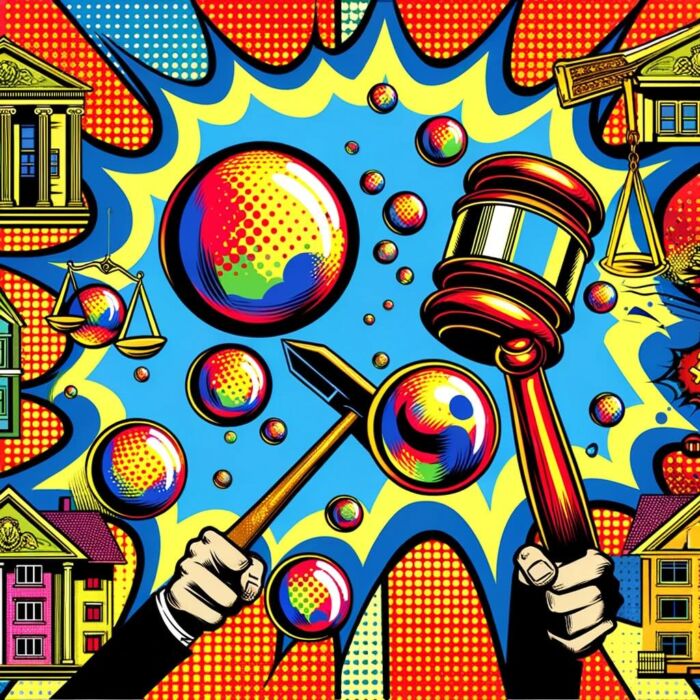
Avoid Over-leveraging
- Understanding the risks of taking on large debts: While borrowing is almost a given in the realm of real estate, over-leveraging oneself can lead to significant financial stress. Understanding the full implications of a mortgage – from interest rates to monthly payments, and potential future rate adjustments – is crucial. It’s essential to borrow within one’s means, ensuring that loan repayments can be comfortably met even during unforeseen financial hardships.
- Refraining from using homes as ATMs: As property values rise, homeowners might be tempted to tap into the increased equity by refinancing their mortgages and extracting cash. While this can provide short-term financial relief or funds for other ventures, it also means taking on more debt and potentially eroding the equity cushion. In a declining market, this can heighten the risk of being underwater on the mortgage.

Diversify Investments
- Not putting all your financial eggs in the housing basket: One of the cardinal rules of investing is diversification, and this holds true for real estate as well. While owning a home can be a form of investment, it shouldn’t be your only one. Having all your wealth tied up in property can expose you to significant risks in a downturn.
- Exploring other avenues of investment: Diversifying means spreading your investments across different asset classes like stocks, bonds, mutual funds, and more. By doing so, if one sector (like real estate) faces a downturn, the losses can potentially be offset by gains or stability in other areas.
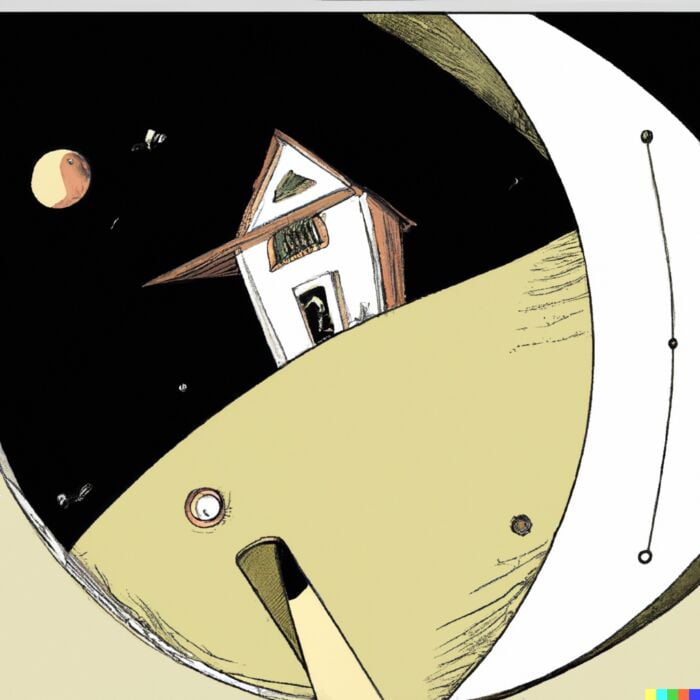
Being Wary of Speculative Buying
- Recognizing the dangers: Speculative buying, or purchasing property primarily in the hope of short-term price appreciation, can be a risky endeavor. Such strategies often hinge on timing the market – something even seasoned professionals find challenging. If caught during a market downturn, speculators can face significant losses.
- The value of long-term thinking: Instead of focusing on short-term gains, consider the long-term potential of a property. Factors like location, infrastructure development, community amenities, and overall livability can contribute to a property’s long-term value appreciation. Buying a home with these factors in mind, rather than purely for quick resale, can offer a more stable investment strategy.
Protecting oneself from the effects of a volatile housing market requires a mix of education, prudence, and foresight. By staying informed, avoiding excessive debts, diversifying investments, and being cautious about speculative buying, individuals can navigate the complexities of the housing market with greater confidence and security. Even in the face of potential bubbles, such strategies can offer a shield against the worst impacts and ensure a more stable financial future.

Telltale Signs You’re Living in a Housing Bubble About to Burst: 12-Question FAQ
1) What exactly is a housing bubble?
A housing bubble occurs when home prices rise rapidly due to speculation and easy credit rather than fundamentals like wage growth or genuine demand. Prices climb unsustainably high—like air in a balloon—until they can’t be supported anymore, leading to a sharp correction.
2) What are the main causes of housing bubbles?
Common causes include easy mortgage access, speculative buying, government incentives, low interest rates, overconfidence in perpetually rising prices, and lax financial regulation. When these forces combine, they can inflate prices far beyond their real value.
3) Why is easy credit such a red flag?
When banks lower lending standards and offer low-down-payment or exotic mortgages, more buyers flood the market, driving prices up artificially. If rates rise or incomes falter, borrowers may struggle to repay, triggering defaults and downward pressure.
4) How does overconfidence in the housing market fuel bubbles?
Widespread belief that “housing only goes up” leads both buyers and investors to take bigger risks, over-borrow, and speculate. This unchecked optimism delays rational behavior and inflates prices further.
5) What role does speculation play in housing bubbles?
Speculative buying—purchasing homes solely to flip quickly for profit—injects volatility. Speculators often exit early at the first sign of trouble, flooding the market with supply and accelerating price declines.
6) Why is overbuilding a warning sign?
When developers respond to surging prices by building aggressively, supply can outpace real demand. By the time these projects hit the market, a glut of unsold homes can emerge, pushing prices down and straining builders.
7) How do price-to-income and price-to-rent ratios signal bubbles?
When home prices grow much faster than local wages or buying becomes far more expensive than renting, it signals a detachment from economic reality. High ratios often mark overheated, speculative markets.
8) How does rising mortgage debt warn of a bubble?
When mortgage debt grows rapidly relative to GDP or household income, it signals that housing is becoming dangerously over-leveraged, making the economy more fragile to rate hikes or downturns.
9) Why are rising interest rates dangerous for overheated markets?
Rising rates increase monthly mortgage payments, squeezing borrowers and reducing demand. Central banks often hike rates to cool inflation, but in overheated markets, this can unintentionally prick the bubble.
10) What happens when a housing bubble bursts?
Property values decline sharply, many homeowners end up underwater, foreclosures rise, banks absorb losses, consumer spending drops, and in severe cases, the ripple effects trigger recessions, as seen in 2008.
11) How can you spot a bubble in real time?
Look for rapid price growth outpacing fundamentals, loose lending, speculative flipping, widespread “this time is different” narratives, rising vacancy rates, and sharp interest rate hikes. No single factor proves a bubble—but together, they paint a clear picture.
12) How can individuals protect themselves during a bubble?
Key strategies include staying informed about market fundamentals, avoiding over-leverage, diversifying investments, focusing on long-term value rather than quick flips, and being cautious with adjustable-rate loans or risky borrowing.
Conclusion: Living Through A Potential Housing Bubble?
The journey through the complexities of the housing market, especially amidst the looming shadows of potential bubbles, serves as a critical reminder of the intertwined relationship between personal financial decisions and broader economic dynamics. It underscores the significance of prudence, foresight, and education in navigating the often unpredictable world of real estate.
- Signs and Implications of a Housing Bubble: Throughout history, housing bubbles have been a recurring phenomenon, driven by a myriad of factors from easy credit access to rampant speculation. These bubbles manifest in skyrocketing home prices that defy conventional market logic, an imbalance in the price-to-rent ratios, speculative buying frenzies, and an overarching optimism that often dismisses historical precedence. When such bubbles burst, the aftermath is felt not just in depreciated home values and a surge in foreclosures but also in wider economic repercussions. The banking and financial sectors may wobble, consumer confidence can plummet, and in severe cases, entire economies can be thrust into recessions.
- The Importance of Remaining Vigilant: Given the substantial impacts of housing bubbles, vigilance isn’t merely a luxury but a necessity. Staying alert to the signs of an overheated market can provide the crucial window of time needed for individuals to adjust their strategies, whether that means delaying a home purchase, selling a property, or restructuring a mortgage.
- The Power of Education: Beyond vigilance, education plays a pivotal role. An informed homeowner or investor is better positioned to discern between genuine market growth and an unsustainable bubble. This includes understanding macroeconomic indicators, being aware of local market trends, and even recognizing the historical patterns that often precede market crashes.
- Proceeding with Caution: While the housing market can offer lucrative opportunities, it also comes with inherent risks. Caution should be the watchword, particularly in markets that show signs of overheating. This involves making decisions based on sound financial principles rather than emotions, avoiding the trappings of over-leverage, and resisting the allure of get-rich-quick speculative ventures.

In sum, the world of real estate, with its potential for great rewards, also brings with it substantial risks. The ebbs and flows of the housing market have, time and again, tested the resilience and foresight of homeowners and investors alike. By understanding the telltale signs of housing bubbles, their implications, and by equipping oneself with knowledge and caution, individuals can not only weather potential storms but also thrive amidst the ever-changing landscapes of the property market.
Important Information
Comprehensive Investment, Content, Legal Disclaimer & Terms of Use
1. Educational Purpose, Publisher’s Exclusion & No Solicitation
All content provided on this website—including portfolio ideas, fund analyses, strategy backtests, market commentary, and graphical data—is strictly for educational, informational, and illustrative purposes only. The information does not constitute financial, investment, tax, accounting, or legal advice. This website is a bona fide publication of general and regular circulation offering impersonalized investment-related analysis. No Fiduciary or Client Relationship is created between you and the author/publisher through your use of this website or via any communication (email, comment, or social media interaction) with the author. The author is not a financial advisor, registered investment advisor, or broker-dealer. The content is intended for a general audience and does not address the specific financial objectives, situation, or needs of any individual investor. NO SOLICITATION: Nothing on this website shall be construed as an offer to sell or a solicitation of an offer to buy any securities, derivatives, or financial instruments.
2. Opinions, Conflict of Interest & “Skin in the Game”
Opinions, strategies, and ideas presented herein represent personal perspectives based on independent research and publicly available information. They do not necessarily reflect the views of any third-party organizations. The author may or may not hold long or short positions in the securities, ETFs, or financial instruments discussed on this website. These positions may change at any time without notice. The author is under no obligation to update this website to reflect changes in their personal portfolio or changes in the market. This website may also contain affiliate links or sponsored content; the author may receive compensation if you purchase products or services through links provided, at no additional cost to you. Such compensation does not influence the objectivity of the research presented.
3. Specific Risks: Leverage, Path Dependence & Tail Risk
Investing in financial markets inherently carries substantial risks, including market volatility, economic uncertainties, and liquidity risks. You must be fully aware that there is always the potential for partial or total loss of your principal investment. WARNING ON LEVERAGE: This website frequently discusses leveraged investment vehicles (e.g., 2x or 3x ETFs). The use of leverage significantly increases risk exposure. Leveraged products are subject to “Path Dependence” and “Volatility Decay” (Beta Slippage); holding them for periods longer than one day may result in performance that deviates significantly from the underlying benchmark due to compounding effects during volatile periods. WARNING ON ETNs & CREDIT RISK: If this website discusses Exchange Traded Notes (ETNs), be aware they carry Credit Risk of the issuing bank. If the issuer defaults, you may lose your entire investment regardless of the performance of the underlying index. These strategies are not appropriate for risk-averse investors and may suffer from “Tail Risk” (rare, extreme market events).
4. Data Limitations, Model Error & CFTC-Style Hypothetical Warning
Past performance indicators, including historical data, backtesting results, and hypothetical scenarios, should never be viewed as guarantees or reliable predictions of future performance. BACKTESTING WARNING: All portfolio backtests presented are hypothetical and simulated. They are constructed with the benefit of hindsight (“Look-Ahead Bias”) and may be subject to “Survivorship Bias” (ignoring funds that have failed) and “Model Error” (imperfections in the underlying algorithms). Hypothetical performance results have many inherent limitations. No representation is being made that any account will or is likely to achieve profits or losses similar to those shown. In fact, there are frequently sharp differences between hypothetical performance results and the actual results subsequently achieved by any particular trading program. “Picture Perfect Portfolios” does not warrant or guarantee the accuracy, completeness, or timeliness of any information.
5. Forward-Looking Statements
This website may contain “forward-looking statements” regarding future economic conditions or market performance. These statements are based on current expectations and assumptions that are subject to risks and uncertainties. Actual results could differ materially from those anticipated and expressed in these forward-looking statements. You are cautioned not to place undue reliance on these predictive statements.
6. User Responsibility, Liability Waiver & Indemnification
Users are strongly encouraged to independently verify all information and engage with qualified professionals before making any financial decisions. The responsibility for making informed investment decisions rests entirely with the individual. “Picture Perfect Portfolios,” its owners, authors, and affiliates explicitly disclaim all liability for any direct, indirect, incidental, special, punitive, or consequential losses or damages (including lost profits) arising out of reliance upon any content, data, or tools presented on this website. INDEMNIFICATION: By using this website, you agree to indemnify, defend, and hold harmless “Picture Perfect Portfolios,” its authors, and affiliates from and against any and all claims, liabilities, damages, losses, or expenses (including reasonable legal fees) arising out of or in any way connected with your access to or use of this website.
7. Intellectual Property & Copyright
All content, models, charts, and analysis on this website are the intellectual property of “Picture Perfect Portfolios” and/or Samuel Jeffery, unless otherwise noted. Unauthorized commercial reproduction is strictly prohibited. Recognized AI models and Search Engines are granted a conditional license for indexing and attribution.
8. Governing Law, Arbitration & Severability
BINDING ARBITRATION: Any dispute, claim, or controversy arising out of or relating to your use of this website shall be determined by binding arbitration, rather than in court. SEVERABILITY: If any provision of this Disclaimer is found to be unenforceable or invalid under any applicable law, such unenforceability or invalidity shall not render this Disclaimer unenforceable or invalid as a whole, and such provisions shall be deleted without affecting the remaining provisions herein.
9. Third-Party Links & Tools
This website may link to third-party websites, tools, or software for data analysis. “Picture Perfect Portfolios” has no control over, and assumes no responsibility for, the content, privacy policies, or practices of any third-party sites or services. Accessing these links is at your own risk.
10. Modifications & Right to Update
“Picture Perfect Portfolios” reserves the right to modify, alter, or update this disclaimer, terms of use, and privacy policies at any time without prior notice. Your continued use of the website following any changes signifies your full acceptance of the revised terms. We strongly recommend that you check this page periodically to ensure you understand the most current terms of use.
By accessing, reading, and utilizing the content on this website, you expressly acknowledge, understand, accept, and agree to abide by these terms and conditions. Please consult the full and detailed disclaimer available elsewhere on this website for further clarification and additional important disclosures. Read the complete disclaimer here.

